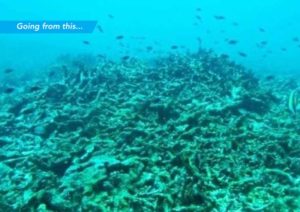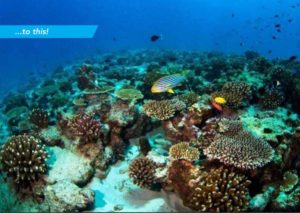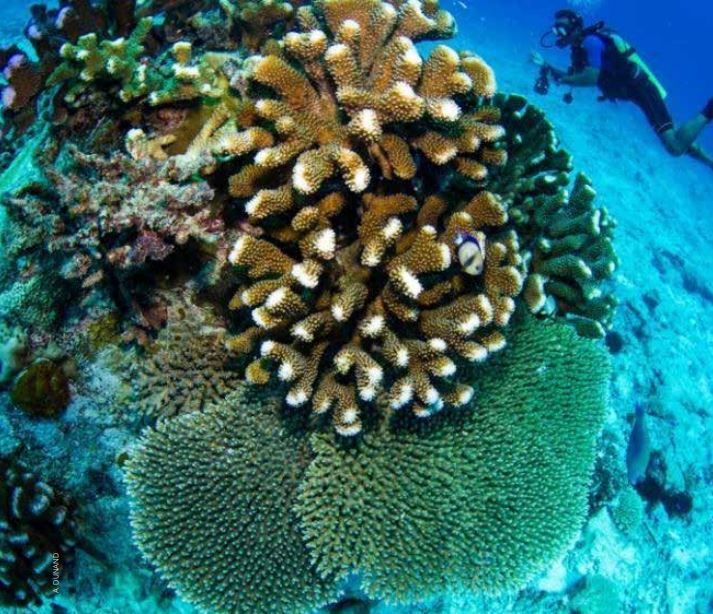When my first book, The Restoration Economy, was published in 2002, it showed how the restoration of coral reefs was vitally important to the future economy and ecology of the planet. But it also pointed out that the state of the science at that time made it largely a dream. Now, that dream is starting to come true.
On December 10, 2018, Nature Seychelles, an NGO, published The Coral Reef Restoration Toolkit; the result of eight years of research. The toolkit derives from a ground-breaking large scale coral reef restoration project the NGO has carried out in the Seychelles, an archipelago of 115 islands in the Indian Ocean off of East Africa.
 Edited by Drs. Sarah Frias-Torres, Phanor H. Montoya-Maya and Nirmal Shah, “The Coral Reef Restoration Toolkit – A Field-Oriented Guide Developed in the Seychelles Islands” describes how to complete a coral reef restoration project using the “coral gardening” concept.
Edited by Drs. Sarah Frias-Torres, Phanor H. Montoya-Maya and Nirmal Shah, “The Coral Reef Restoration Toolkit – A Field-Oriented Guide Developed in the Seychelles Islands” describes how to complete a coral reef restoration project using the “coral gardening” concept.
It is based on an 8-year-old pioneering coral reef restoration project in the island nation called the “Reef Rescuers.” Nature Seychelles started the Reef Rescuers project in 2010, after receiving a grant from the United States Agency for International Development (USAID) to combat climate change-induced coral bleaching in Seychelles.
The launch coincided with the Reef Futures Symposium held in Key Largo, Florida from December 10-14, 2018. Over 550 scientists and practitioners gathered there for the first global conference dedicated to the science and practice of coral reef restoration.
 In a world-first, the Reef Rescuers project raised over 40,000 corals fragments in underwater nurseries and transplanted over 24,000 onto 5,225m2 of degraded reef—the size of a futbol pitch—at Cousin Island Special Reserve, a 50-year old Marine Protected Area managed by the NGO.
In a world-first, the Reef Rescuers project raised over 40,000 corals fragments in underwater nurseries and transplanted over 24,000 onto 5,225m2 of degraded reef—the size of a futbol pitch—at Cousin Island Special Reserve, a 50-year old Marine Protected Area managed by the NGO.
23 staff and over 40 volunteer scientific divers from around the world helped to deliver the project. This compilation of tools is the result of their hard work. The toolkit was tested during the NGOs first restoration training program. Participants contributed suggestions to the toolkit and have helped to cascade these field-tested methodologies, tools, and trained personnel to other areas across the globe.
The NGO, with further support from USAID, in 2017 opened the Centre for Ocean Restoration Awareness and Learning (CORAL) in Seychelles to serve as a national and regional hub for knowledge sharing on coral reef conservation and restoration.
Announcing the toolkit’s launch, Nature Seychelles’ Chief Executive Dr. Nirmal Shah said, “This is an opportune moment to showcase our efforts in Seychelles to the global coral reef restoration community.”
“We want to share best practices, techniques, and tools, as well as challenges and lessons learnt to help others who might want to carry out similar work. Scientists who worked on the toolkit are attending the conference and will be on hand to discuss these efforts,” she continued.
The toolkit describes the protocol used in the restoration, as well as guidance on appropriate design, logistics, and execution of the project based on experience and field tested methods. It aims to be a companion for scientists, managers, practitioners and local communities who are facing a coral reef restoration challenge and require guidance.
“We explain the methods used in our coral reef restoration project and how we solved the problems encountered, using low cost solutions with the limited resources found in a small island developing nation,” Torres, Montoya-Maya and Shah added.
All photos courtesy of Nature Seychelles.
Download The Coral Reef Restoration Toolkit from the Nature Seychelles website.

